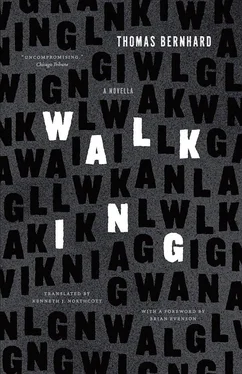non . Of course, an earth that was gradually dying out and finally one without human beings would probably be the most beautiful, says Oehler, after which he says, the thought is, of course
non sense. But that doesn’t alter the fact, says Oehler, that day in day out you have to stand by and see how more and more people are made with more and more inadequacy and with more and more misfortune, who have the same capacity for suffering and the same frightfulness and the same ugliness and the same detestableness as you yourself have, and who, as the years go by, have an even greater capacity for suffering and frightfulness and ugliness and detestableness. Karrer was of the same opinion, says Oehler. Oehler keeps repeating,
Karrer’s view was the same or
Karrer had a similar view or
Karrer had a different or
a contrary view (
or opinion ). Karrer’s statement always went: How do these people, who do not know how they get to such a point, and who have never been asked a question that affected them, how do all these people, with whom, if we think about it, we are bound again and again and with the greatest soundness of mind, to identify ourselves, throughout the course of their lives, no matter who they are, no matter what they are, and no matter where they are, how can they, I say, hurl themselves with ever more terrifying speed into, up into, and down into, their ultimate misfortune with all the horrible — that is human — means at their disposal? My whole life long, I have refused to make a child, said Karrer, Oehler says, to add a new human being over and above the person that I am, I who am sitting in the most horrible imaginable prison and whom science ruthlessly labels as human, I have refused to add a new human being to the person who is in the most horrible prison there is and to imprison a being who bears my name. If you walk along Klosterneuburgerstrasse, and especially if you walk along Klosterneuburgerstrasse with your eyes open, says Oehler, the making of children and everything connected with the making of children completely fades away from you. Then everything fades away from you, Oehler quotes Karrer as saying. I am struck by how often Oehler quotes Karrer without expressly drawing attention to the fact that he is quoting Karrer. Oehler frequently makes several statements that stem from Karrer and frequently thinks a thought that Karrer thought, I think, without expressly saying, what I am now saying comes from Karrer.
Fundamentally, everything that is said is a quotation is also one of Karrer’s statements, which occurs to me in this connection and which Oehler very often uses when it suits him. The constant use of the concept
human nature and
nature and in this connection
horrible and
repugnant and
dreadful and
infinitely sad and
frightful and
disgusting can all be traced back to Karrer. I think now that I went walking with Karrer on Klosterneuburgerstrasse for twenty years, says Oehler, like Karrer I grew up on Klosterneuburgerstrasse, and we both knew what it means to have grown up on Klosterneuburgerstrasse, this knowledge has underlain all our actions and all our thinking and, especially, the whole time we were walking together. Karrer’s pronunciation was the clearest, Karrer’s thought the most correct, Karrer’s character the most irreproachable, says Oehler. But recently I had already detected signs of fatigue in his person, above all in his mind, on the other hand his mind was unbelievably active, in a way I had never noticed before. On the one hand Karrer’s body, which had suddenly grown old, says Oehler, on the other, Karrer’s mind, which was capable of incredible intellectual acuity. His sudden physical decrepitude on the one hand, says Oehler, the sudden weirdness and outrageousness of the thoughts in his head on the other. Whereas Karrer’s body, especially in the past year, could very often be seen as a body that had already declined and was in the process of disintegrating, says Oehler, the capacity of his mind was at the same time, in its outrageousness, truly terrifying to me. I suddenly had to consider what sorts of outrageousness this mind of Karrer’s was capable of, says Oehler, on the other hand how decrepit this body of Karrer’s is, a body that is not yet really old. Doubtless, says Oehler, Karrer went mad when he was at the height of his thinking. This is an observation that science can always make in the case of people like Karrer. That they suddenly, at the height of their thinking, and thus at the height of their intellectual capacity, become mad. There is a moment, says Oehler, at which madness
enters . It is a single moment in which the person affected
is suddenly mad . Again, Oehler says: in Karrer’s case it is a question of a total, final madness. There’s no point in thinking that Karrer will come out of Steinhof again as he did eight years ago. We shall probably never see Karrer again, says Oehler. There is every sign, says Oehler, that Karrer will stay in Steinhof and not come out of Steinhof again. The depression caused by a visit to Karrer in Steinhof would probably be so violent, says Oehler, especially for his mind and as a result, in the nature of things, for his thinking, that such a visit would have the most devastating effect, so that there is no point in thinking about a visit to Karrer in Steinhof. Not even if we were to go together to visit Karrer, says Oehler. If I go alone to see Karrer, it will be the ruin of me for weeks, if not for months, if not forever, says Oehler. Even if you visit Karrer, says Oehler to me, it will be the ruin of you. And if we go together, a visit of that sort would have the same effect on both of us. To visit a person in the condition that Karrer finds himself at the moment would be nonsense, because visiting a person who is totally and finally mad makes no sense. Quite apart from the fact, says Oehler, that every visit to Steinhof has depressed me, visiting a lunatic asylum requires the greatest effort, says Oehler, if the visitor is not a fool without feeling or the capacity to think. It makes me feel ill even to approach Steinhof, let alone go inside. The world outside lunatic asylums is scarcely to be borne, he says. If we see hundreds and thousands of people, of whom, with the best will in the world and with the greatest self-abnegation, we cannot say that we are still dealing with human beings, he says. If we always see that things are much worse in lunatic asylums than we imagined they were before we visited a lunatic asylum. Then, when we are in Steinhof, says Oehler, we recognize that the unbearableness of life outside lunatic asylums — which we have always separated from the life and existence and existence from life and the existence and existing inside lunatic asylums—
outside lunatic asylums is really laughable compared with the insupportability
in lunatic asylums. If we are qualified to compare, says Oehler, and to declare ourselves satisfied with the justness of the concepts of inside and outside, that is, inside and outside lunatic asylums, and with the justness of the concepts of the so-called intact as distinct from the concepts of the so-called nonintact world. If we have to tell ourselves that it is only a question of the brutality of a moment to go to Steinhof. And if we know that this moment can be any moment. If we know that every moment can be the one when we cross the border into Steinhof. If you had said to Karrer three weeks ago that he would be in Steinhof today, says Oehler, Karrer would have expressed doubt, even if he had taken into consideration the possibility that at any moment he might be back in Steinhof. Here on this very spot, I said to Karrer, says Oehler, and he stops walking: if it is possible to control the moment that no one has yet controlled, the moment of the final crossing of the border into Steinhof, and that is, into final madness, without being able to finish the unfinished statement, says Oehler, Karrer said at that time, he did not understand what was doubtless an unfinished statement, but that he knew what was meant by this unfinished statement. Even Karrer did not succeed where no one has yet succeeded, says Oehler, in knowing the moment when the border to Steinhof is to be crossed and thus the moment the border into final madness is to be crossed. When we do something, we may not think about why we are doing what we are doing, says Oehler, for then it would suddenly be totally impossible for us to do anything. We may not make what we are doing the object of our thought, for then we would first be the victims of
Читать дальше












